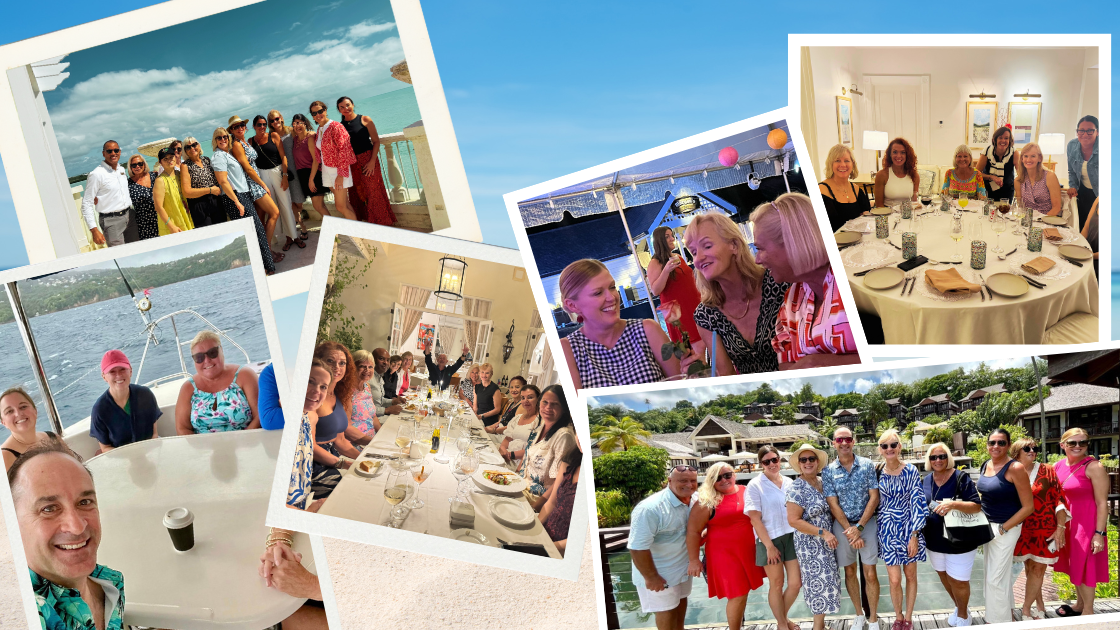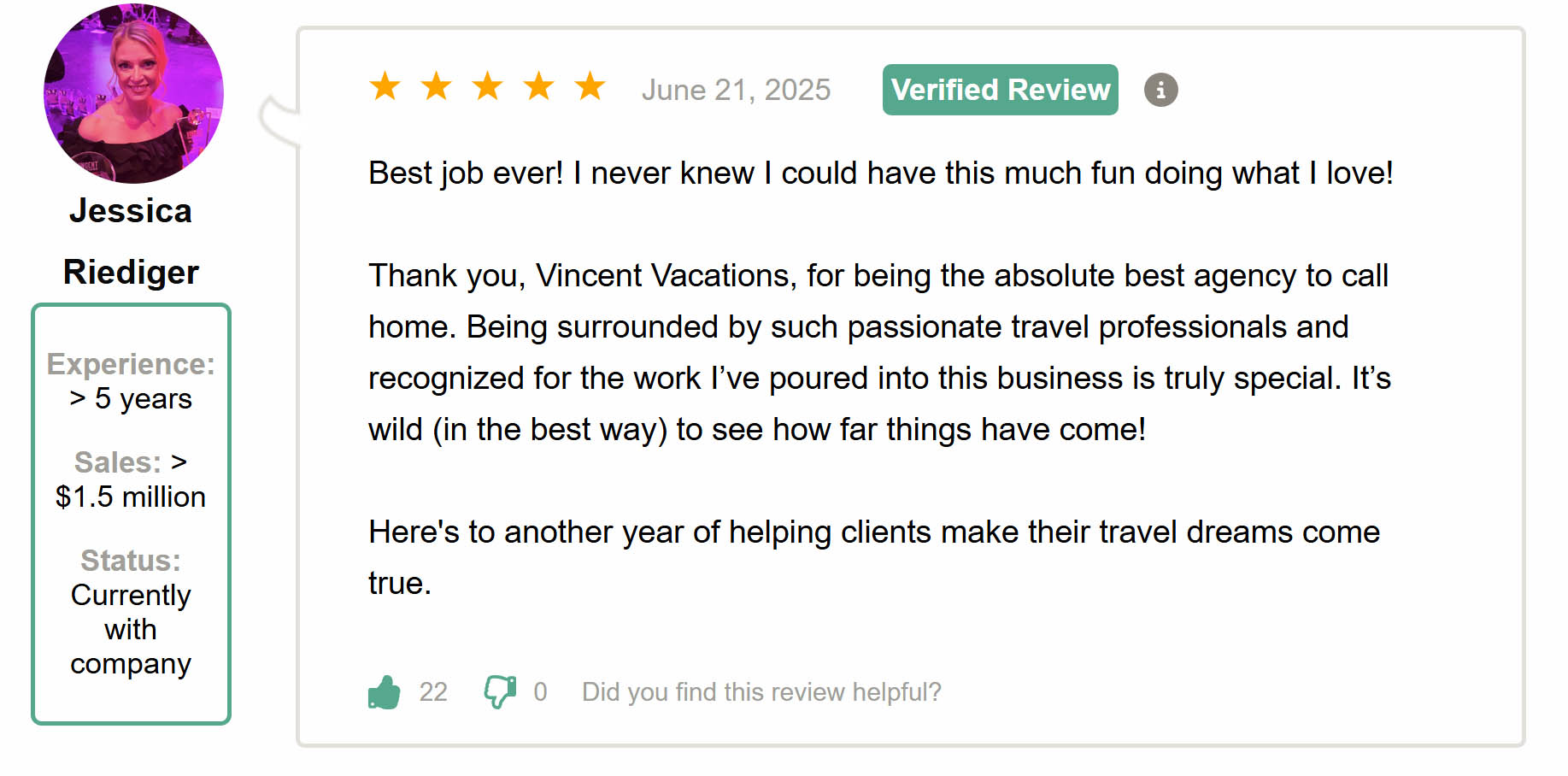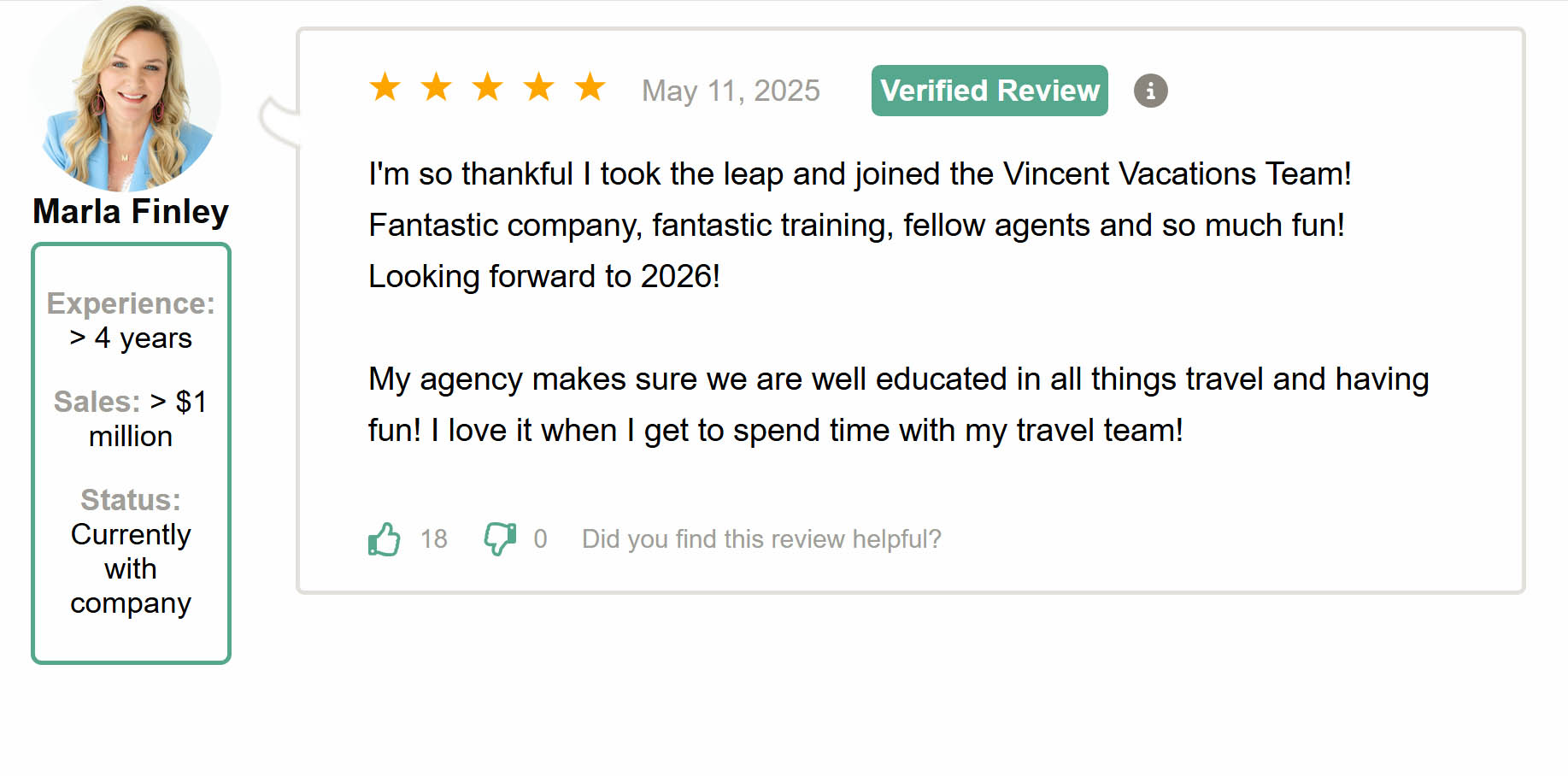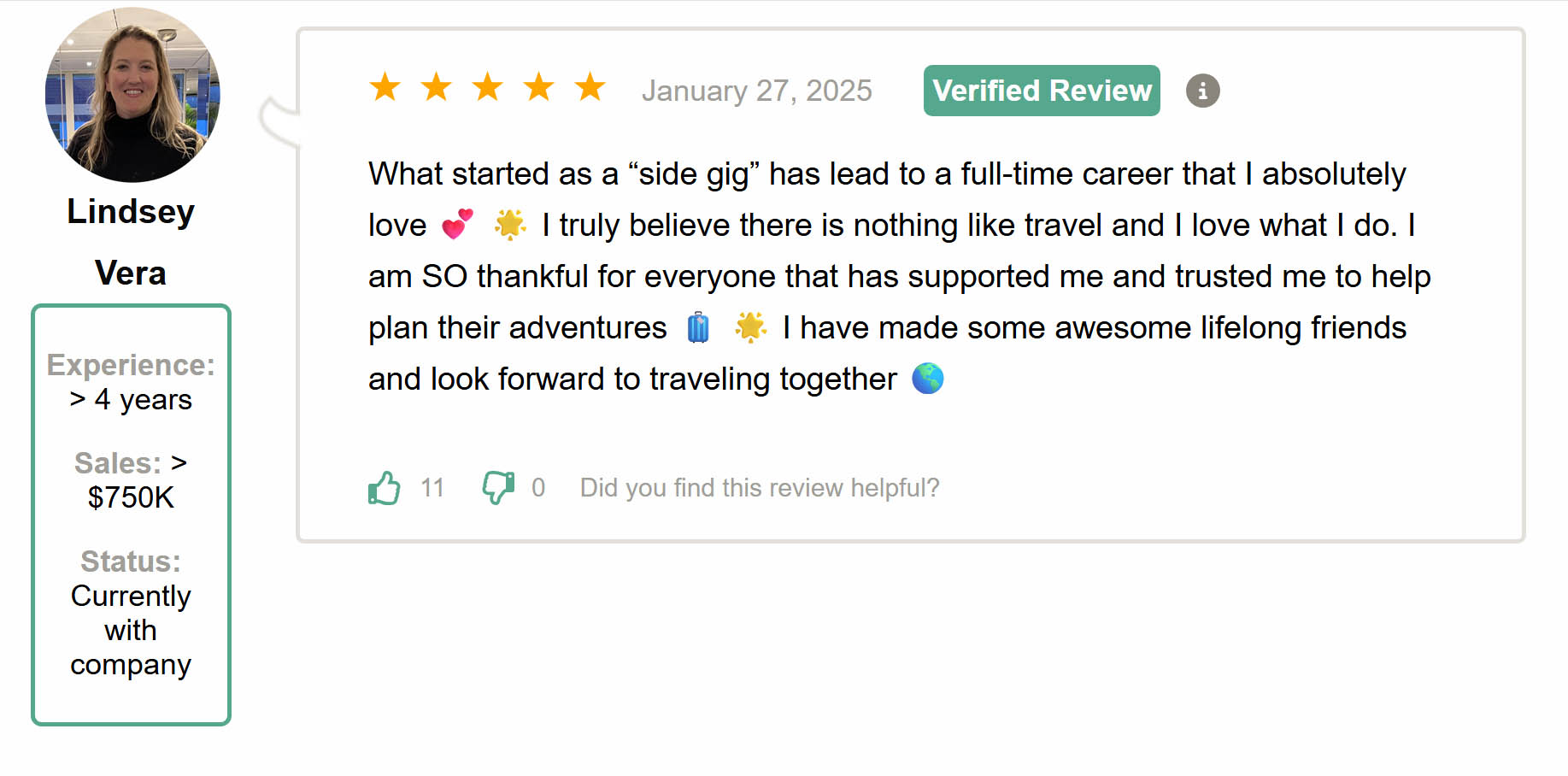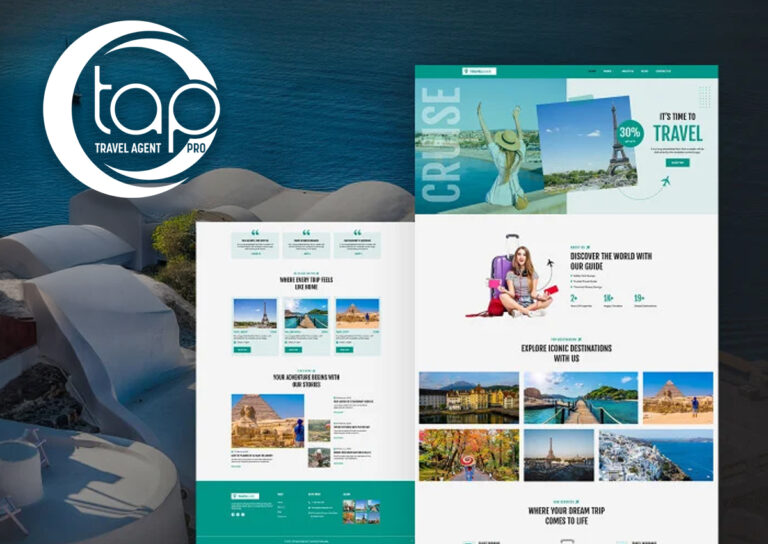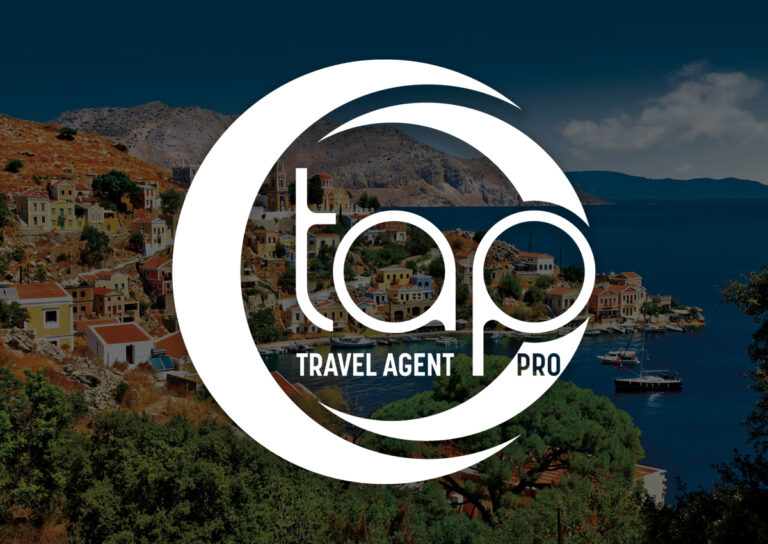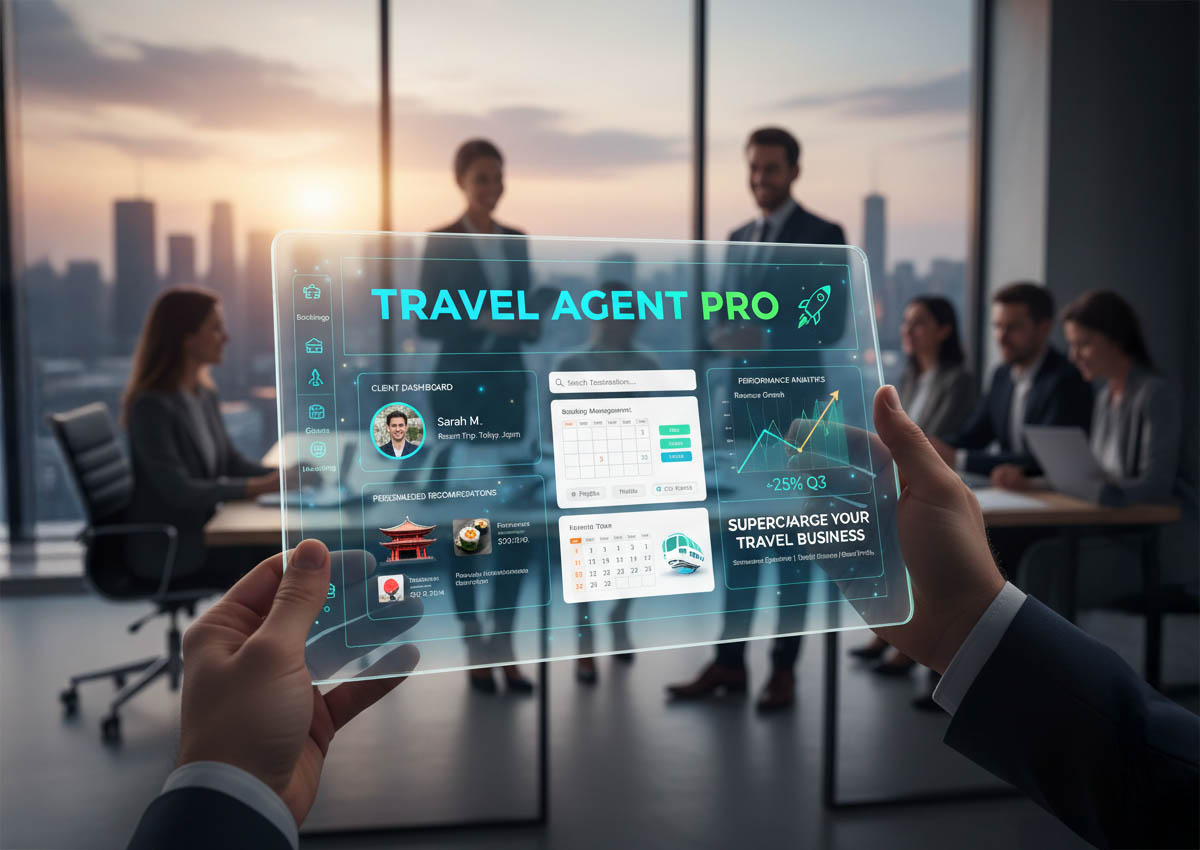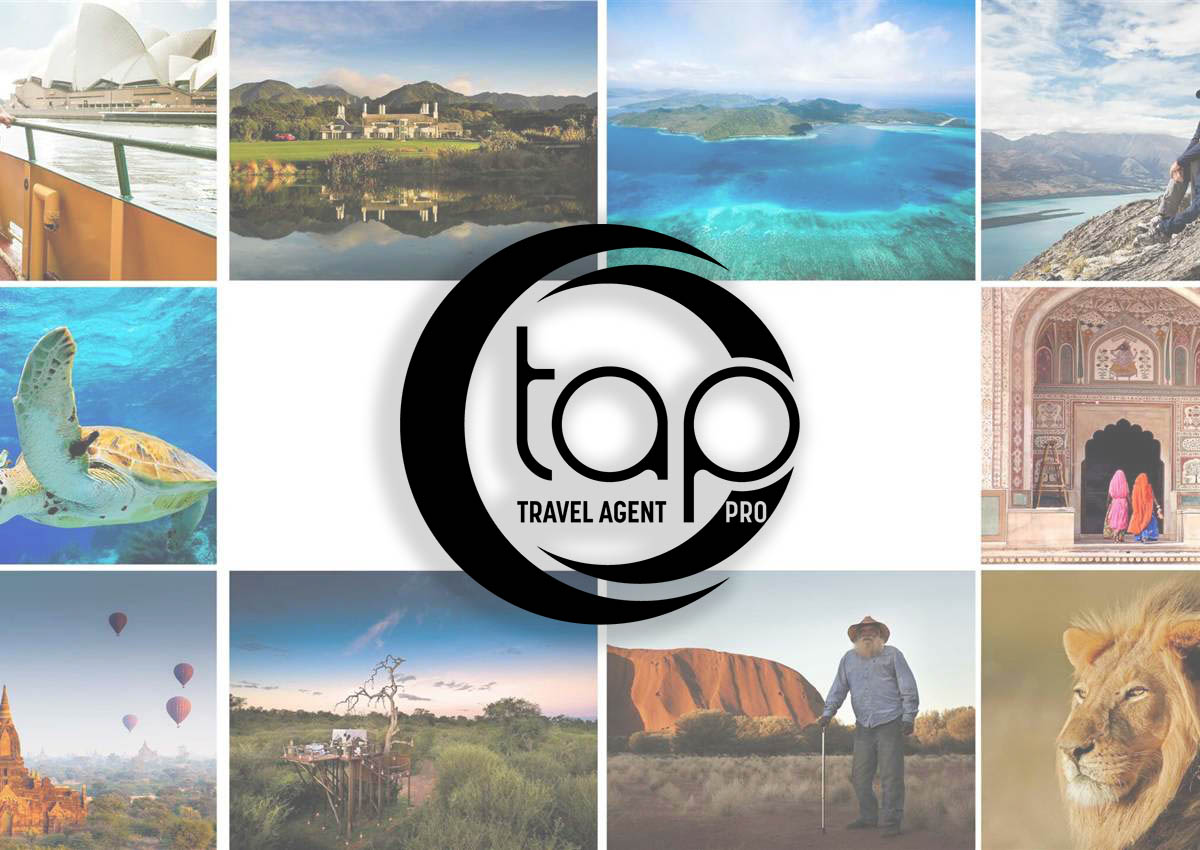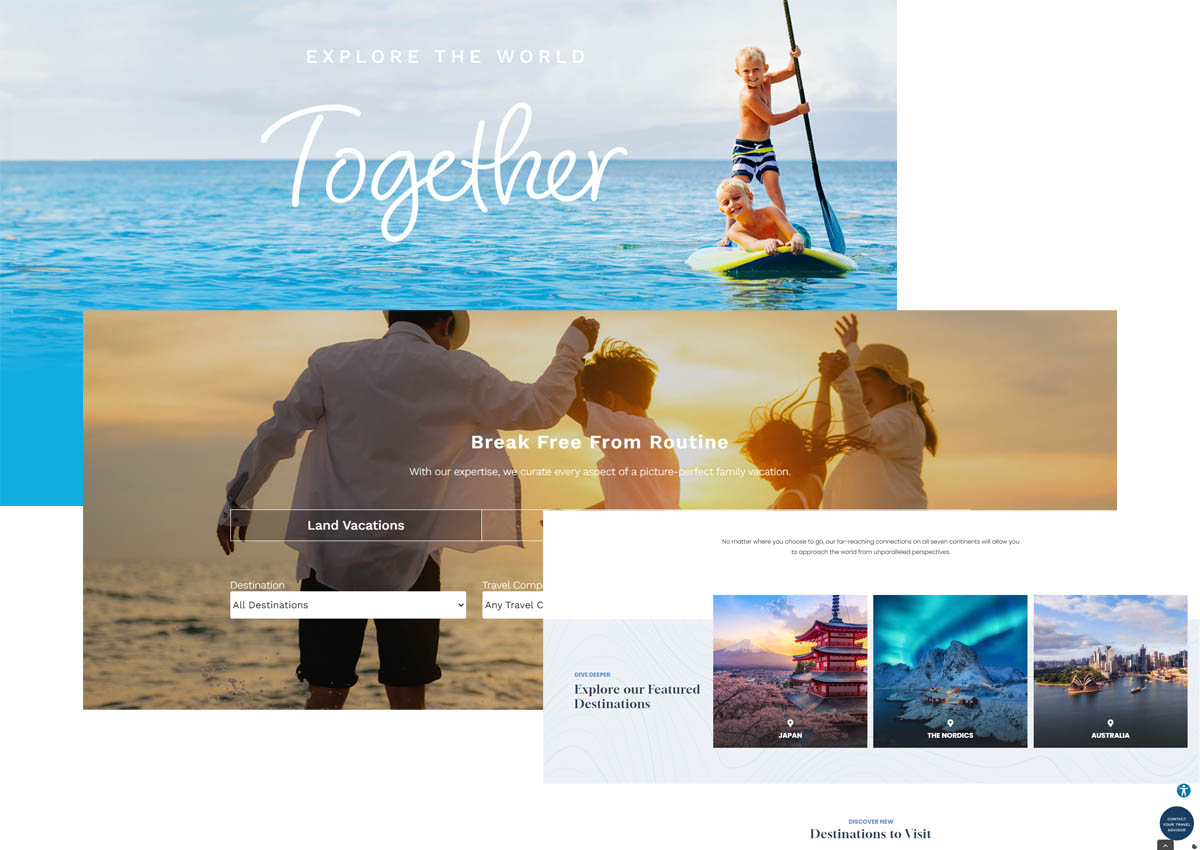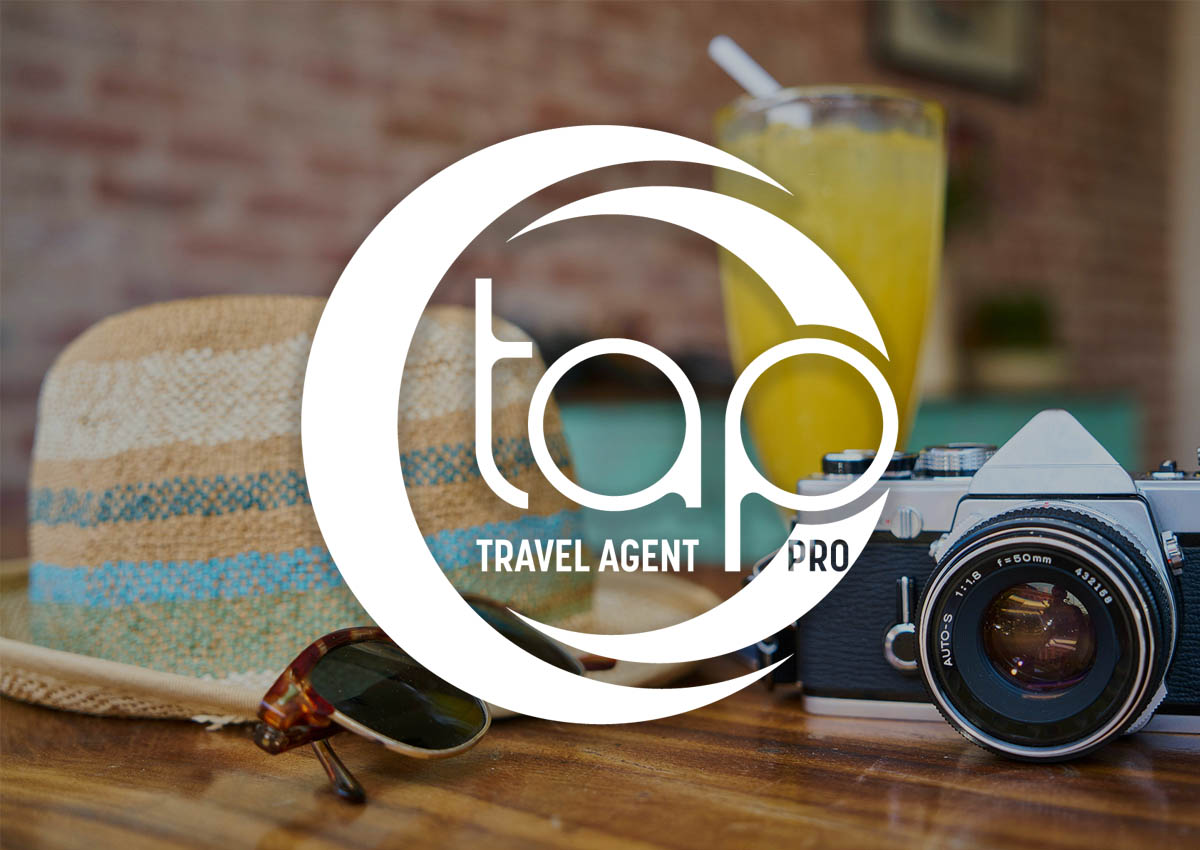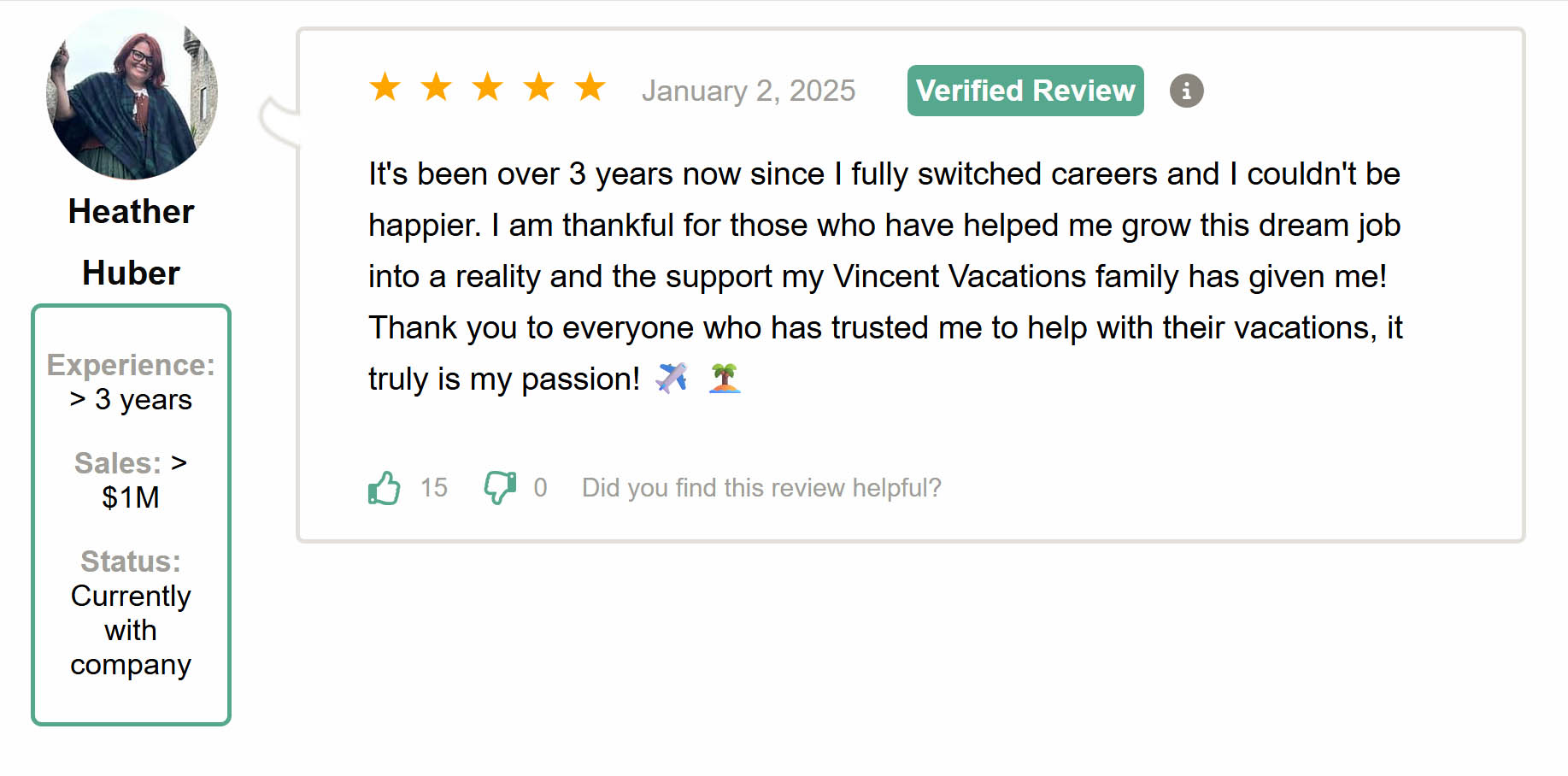Category :
GeneralGuide to Becoming a Full Time Travel Agent
To learn more techniques and how to create and grow your own travel business, sign-up to become a member today!

Transitioning from part-time to full-time as a travel agent is an exciting journey filled with opportunities and challenges. Whether you're balancing a day job or exploring travel sales as a passion, moving into full-time travel advising can open doors to a rewarding career in the travel industry.
This guide will walk you through key considerations such as building your client base, enhancing your industry knowledge, and managing your business effectively. Understanding these aspects will help you confidently step into full-time travel agency work and thrive.
Your Host Travel Agency
Launched by industry veterans, Vincent Vacations is working to carve out a niche as a boutique, community-driven option designed by advisors, for advisors.
Learn MoreWhy consider going full time?
Going full time allows you to leverage your expertise more deeply, build stronger relationships with clients, and access better industry perks and commissions. It also gives you the freedom to shape your schedule around your personal and professional goals.
Key steps to prepare:
| Step | Description |
|---|---|
| 1. Build a solid client base | Focus on nurturing relationships and delivering excellent service to your existing clients while expanding your network. |
| 2. Gain industry certifications | Obtain relevant travel certifications to boost credibility and deepen your product knowledge. |
| 3. Plan your finances | Prepare a budget and savings plan to support the initial transition period where income might fluctuate. |
| 4. Develop marketing skills | Learn how to promote your services effectively through social media, email, and other channels. |
"Patience and persistence are your best travel companions on this path."
Starting part-time is a fantastic way to test the waters, gain confidence, and refine your skills. When you feel ready, moving into full-time travel agency work can bring both personal satisfaction and professional growth.

Understanding the Travel Agent Career Path
Typical Career Progression from Part-time to Full-time Agent
Starting as a part-time travel agent offers flexibility and valuable experience. Many agents begin by handling bookings and consultations during evenings or weekends, gradually building a client base. Over time, as confidence and skills grow, transitioning to a full-time role becomes a natural step. This progression often involves increasing responsibilities such as managing more complex itineraries and developing sales strategies.
Key milestones in this journey include achieving consistent sales, mastering reservation systems, and gaining repeat clients. Embracing challenges like last-minute changes and customer service issues helps build resilience and expertise.
Specializing in Niche Markets to Differentiate Your Services
To stand out in a competitive industry, many agents choose to specialize in niche markets. These can include luxury travel, adventure tourism, eco-travel, cruises, or destination weddings. Focusing on a niche allows you to become an expert in that area, offering tailored advice and exclusive deals that generic agents may not provide.
Becoming a niche specialist often involves networking with suppliers and attending industry events to deepen your knowledge. This specialization not only attracts a loyal client base but also enhances your professional reputation.
The Role of Continued Education and Certifications in Career Growth
Ongoing education is essential for career advancement as a travel agent. Certifications from recognized bodies, such as the Travel Institute or Cruise Lines International Association, enhance credibility and demonstrate commitment to the profession.
Benefits of Continued Education
- Access to the latest industry knowledge and technology.
- Improved customer service skills and product expertise.
- Greater earning potential and job security.
Many agents also take courses in marketing, digital tools, and client relationship management to stay competitive. Strong education combined with practical experience creates a solid foundation for a successful full-time travel career.
"The more you learn, the more you earn." – A well-known principle for travel professionals.

Essential Skills and Experience for Transitioning to Full-time Travel Agent
Making the shift from part-time to full-time travel agent requires a blend of skills and experience that create a strong foundation for success. This transition is not only about increasing hours but also about deepening expertise and refining your approach to the travel business.
Leveraging Customer Service and Hospitality Backgrounds
Customer service and hospitality experience are invaluable assets when becoming a full-time travel agent. These fields sharpen your ability to communicate effectively, handle challenges with grace, and anticipate client needs.
“Empathy, patience, and clear communication are the cornerstones of excellent client relations, which are just as important in travel planning as in hospitality.”
If you have worked in hotels, restaurants, or any service-oriented role, you already possess key skills such as problem-solving on the fly and creating memorable experiences, which directly translate into travel planning and booking.
Developing Sales, Marketing, and Client Relationship Skills
To thrive as a full-time travel agent, you must hone your sales and marketing skills. These help you attract new clients and retain existing ones through engaging communication and targeted promotions.
Strong client relationship management is also crucial. This means following up after bookings, remembering preferences, and offering personalized recommendations, which lead to repeat business and valuable referrals.
Time Management and Business Operations for Full-time Success
Managing your time efficiently and mastering business operations are essential when your travel agent role becomes your main occupation.
| Strategy | Description |
|---|---|
| Prioritization | Identify urgent vs. important tasks to allocate your focus wisely. |
| Scheduling | Block out dedicated times for client meetings, research, and administrative work. |
| Automation | Use tools for booking, invoicing, and follow-ups to reduce manual workload. |
Your Host Travel Agency
Launched by industry veterans, Vincent Vacations is working to carve out a niche as a boutique, community-driven option designed by advisors, for advisors.
Learn MoreAlongside time management, understanding the financial and operational side of your business—such as budgeting, record keeping, and legal requirements—will empower you to run a sustainable travel agency.
Remember: Transitioning to full-time is a journey that combines your passion for travel with business savvy.
With the right skills and mindset, you can create a rewarding career helping others explore the world.

Education, Training, and Certification Programs for Travel Agents
Embarking on the journey from part-time to full-time travel agent requires a solid foundation of knowledge, skills, and credentials. The travel industry offers a variety of education, training, and certification programs designed to prepare agents for success in this dynamic field.
Industry-recognized Certifications: CTA, CTC, and Destination Specialist
Certifications such as the Certified Travel Associate (CTA) and the Certified Travel Counselor (CTC) are highly respected credentials that validate an agent's expertise and professionalism.
These certifications often require a combination of coursework, exams, and practical experience, offering a structured path to build credibility and trust with clients.
Comprehensive Training Programs and Masterclasses for Skill Building
Beyond certifications, many travel agents benefit from comprehensive training programs and masterclasses that focus on developing both technical skills and customer service excellence.
What these programs cover:
- Booking systems and technology
- Travel regulations and compliance
- Sales and marketing strategies
- Client relationship management
- Crisis management and problem solving
Such training helps agents stay current with industry trends and sharpen their abilities to handle complex itineraries and client needs efficiently.
Choosing Between Host Agency Training and Independent Learning
When deciding how to pursue education and training, agents often weigh the benefits of host agency training versus independent learning.
| Aspect | Host Agency Training | Independent Learning |
|---|---|---|
| Structure | Guided curriculum and mentorship | Self-paced and flexible |
| Support | Ongoing support from experienced agents | Requires self-motivation and discipline |
| Cost | Often included in agency fees | Varies by course provider |
| Networking | Access to agency community and clients | Limited unless self-initiated |
Choosing the right path depends on your learning style, resources, and career goals. Many agents find a hybrid approach beneficial—starting with host agency training to build a strong foundation, then supplementing with independent courses tailored to their specialty interests.
Tip: Commit to lifelong learning to stay adaptable and competitive in the travel industry. The investment in education pays off in confidence, expertise, and client satisfaction.
Become a Travel Agent: Unleash Your Full Potential
Ready for a career that's as fulfilling as it is rewarding? Becoming a travel agent with Vincent Vacations means building a business around your passion for travel.

Business Models and Legal Considerations for Full-time Travel Agents
Working with Host Agencies vs. Independent Travel Agent Models
Choosing between working with a host agency and operating as an independent travel agent is a key decision for those transitioning from part-time to full-time. Host agencies offer valuable support services such as marketing, booking platforms, and access to supplier relationships, which can help you get started quickly and reduce overhead costs.
In contrast, independent agents enjoy full control over their business, including setting their own brand, choosing suppliers, and managing client relationships directly. However, this model requires more effort in building infrastructure and may involve higher startup costs.
Understanding Commission Structures and Fee-based Services
Travel agents typically earn income through commission paid by travel suppliers, such as airlines, hotels, and tour operators. Commissions can vary widely depending on the supplier and product type. It’s important to understand these structures clearly to forecast your revenue.
Alternatively, some agents adopt a fee-based service model, charging clients directly for their expertise, itinerary planning, and personalized services. This can supplement or replace commissions and often appeals to clients seeking bespoke travel experiences.
Note: Combining commission and fees strategically can help stabilize income, especially during market fluctuations.
Legal Requirements, Licensing, and Insurance Needs
Transitioning to full-time travel agent status means ensuring compliance with legal regulations. While requirements vary by region, many jurisdictions require specific licenses or registrations to operate legally.
Additionally, securing professional liability insurance and business insurance protects you from potential claims related to errors, omissions, or unforeseen travel disruptions.
Staying informed about consumer protection laws, contract obligations, and data privacy is essential to maintain trust and credibility with clients.
Checklist for Legal Readiness
- Obtain necessary business licenses or permits
- Register your business name if required
- Purchase professional liability insurance
- Understand local consumer protection laws
- Prepare clear client contracts and cancellation policies

Building a Sustainable Client Base and Growing Your Travel Business
Growing a successful travel business requires consistent effort in attracting new clients and keeping existing ones engaged. Building a sustainable client base is not just about making sales but cultivating relationships that encourage loyalty and repeat business. Strong client relationships form the foundation of a thriving travel agency.
Effective Client Acquisition and Retention Strategies
Client acquisition begins with understanding your target market’s needs and offering personalized travel solutions that excite and satisfy them. Strategies include:
- Providing exceptional customer service to build trust and rapport
- Offering exclusive deals or customized packages to differentiate yourself
- Following up post-trip with surveys or personalized thank-you notes to nurture ongoing relationships
Retention is equally important. Regular communication via newsletters, travel tips, and updates about new destinations keeps clients interested and encourages repeat bookings.
“A loyal client is worth more than a thousand one-time customers.”
Utilizing Social Media and Online Marketing for Travel Agents
Social media platforms are powerful tools to showcase your expertise and engage with a broad audience. Travel agents can use:
- Instagram and Pinterest to share inspiring travel photos and stories
- Facebook groups to connect with community members and offer travel advice
- LinkedIn to network professionally and establish credibility
Online marketing strategies such as search engine optimization (SEO), targeted ads, and email campaigns help attract clients actively searching for travel services. A well-maintained website with client testimonials and a blog featuring travel tips can boost your visibility and authority.
Tips for Social Media Success
- Post regularly with engaging content
- Use hashtags relevant to travel and your niche
- Host giveaways or contests to increase engagement
Networking with Industry Professionals and Joining Travel Consortia
Building relationships within the travel industry can open doors to exclusive deals, training, and support. Consider:
| Networking | Joining Travel Consortia |
|---|---|
| Access to insider knowledge and trends | Collective buying power for better rates |
| Referrals and partnership opportunities | Marketing support and shared resources |
| Professional development and mentorship | Enhanced credibility with clients |
Attending industry conferences, participating in workshops, and joining local or international travel associations help you stay updated and connected. Strong industry ties can significantly accelerate your growth as a full-time travel agent.

Switching from Part-time to Full-time: Practical Transition Strategies
Financial Planning and Managing Income Fluctuations
Transitioning from part-time to full-time work as a travel agent involves careful financial planning. It’s essential to anticipate and manage income fluctuations that can occur during this period. Many new full-time travel agents experience variable monthly earnings as they build their client base and adjust to the demands of a full-time schedule.
Consider creating a detailed budget that accounts for both fixed expenses, like rent and utilities, and variable costs, such as marketing or continuing education. Setting aside an emergency fund to cover 3-6 months of expenses can provide a safety net during slower months.
Your Host Travel Agency
Launched by industry veterans, Vincent Vacations is working to carve out a niche as a boutique, community-driven option designed by advisors, for advisors.
Learn MoreCommunicating with Current Employers and Clients About Your Transition
Open and honest communication is key when shifting from part-time to full-time status. If you currently work for an employer or manage clients on a part-time basis, informing them about your new availability and commitment level helps maintain trust and professionalism.
When discussing your transition with employers, clarify your new hours and responsibilities to set clear expectations. With clients, express enthusiasm about your increased availability and ability to offer more personalized service.
“Clear communication not only prevents misunderstandings but also strengthens relationships during times of change.”
Planning and Executing a Smooth Transition to Full-time Status
Making a smooth switch to full-time work requires thoughtful planning and execution. Start by setting realistic goals and timelines for your transition. This might include gradually increasing your workload or client appointments to avoid burnout.
Consider this checklist for a smooth transition:
- Review and update your business plan.
- Enhance your marketing efforts to attract more clients.
- Schedule regular breaks to maintain work-life balance.
- Seek mentorship or join travel agent communities for support.
Remember, transitioning to full-time is a journey. Celebrate small milestones and remain flexible to adjust strategies as you learn from experience.
For Both Aspiring and Experienced Travel Advisors
Build a travel business doing what you love - on your own terms. Start booking trips the day you join, with a best-in-class education curriculum developed by industry experts.

Technology and Tools to Support Full-time Travel Agents
Transitioning from part-time to full-time travel agent means embracing a variety of technology and tools that streamline daily tasks and enhance client relationships. These tools not only boost efficiency but also help maintain a professional edge in a competitive market. Below, we explore key categories of technology essential for full-time travel agents.
Booking and CRM Software for Efficient Client Management
One of the most important investments for a full-time travel agent is a robust booking and Customer Relationship Management (CRM) software. These platforms help you organize client data, track bookings, and manage itineraries all in one place. With features like automated reminders, payment tracking, and client history, these tools reduce administrative burden and allow you to focus more on personalized service.
Marketing Automation and Analytics Tools
Marketing automation tools are essential for growing your client base and nurturing leads. By automating email campaigns, social media posts, and follow-ups, you save valuable time while maintaining consistent communication. Coupled with analytics tools, these platforms provide insights into customer behavior and campaign performance, enabling you to make data-driven decisions to optimize your marketing efforts.
Benefits of Marketing Automation
- Personalized client outreach at scale
- Improved lead conversion rates
- Efficient campaign management and scheduling
- Tracking ROI with detailed analytics
Utilizing Virtual Communication Platforms for Client Engagement
Staying connected with clients is critical in building trust and closing sales. Virtual communication platforms such as video conferencing, instant messaging, and collaborative tools enable you to offer real-time consultations and seamless support regardless of location. These tools foster stronger relationships and provide a personal touch that clients appreciate, especially when planning complex trips.
“Effective communication is the foundation of exceptional travel service. Leveraging virtual platforms can transform client interactions and boost satisfaction.”

Overcoming Challenges Unique to Full-time Travel Agents
Managing Work-life Balance and Avoiding Burnout
Transitioning to a full-time travel agent role brings the exciting opportunity to fully immerse yourself in the industry, but it also requires careful management of work-life balance. Without clear boundaries, the flexibility that makes this career attractive can lead to long hours and burnout.
Consider adopting a structured daily schedule and setting dedicated work hours to protect personal time. Utilizing tools like digital calendars and task managers can help keep workload manageable. Remember, self-care is essential; take regular breaks, set realistic goals, and learn to delegate or say no when necessary.
Dealing with Travel Industry Volatility and Market Changes
The travel industry is highly dynamic and susceptible to sudden changes due to economic shifts, global events, or evolving traveler preferences. Full-time travel agents must cultivate resilience and adaptability to thrive amidst this volatility.
Staying informed through industry news, joining professional networks, and continuous learning helps anticipate market fluctuations. Flexibility in your service offerings and being ready to pivot strategies or focus areas can safeguard your business.
Common Volatility Factors
- Seasonal demand changes
- Global health crises or travel restrictions
- Currency fluctuations impacting pricing
- Technological advancements changing booking habits
Handling Client Expectations and Complex Travel Issues
As a full-time travel agent, you will often face complex client needs and unexpected travel disruptions. Managing expectations clearly and empathetically is key to maintaining trust and satisfaction.
Develop strong communication skills and establish transparent policies about cancellations, delays, and changes. Use proactive problem-solving strategies and keep clients informed throughout their travel journey.
| Skill | Purpose |
|---|---|
| Active Listening | Understand client concerns and preferences fully |
| Clear Communication | Set realistic expectations and avoid misunderstandings |
| Conflict Resolution | Resolve issues calmly and professionally |
| Resourcefulness | Find alternative solutions quickly when plans change |
“The hallmark of a great travel agent is not just booking trips but guiding travelers through the unexpected with confidence and care.”

Advanced Career Development and Growth Opportunities for Full-time Travel Agents
Transitioning to full-time travel agency work opens a wide array of exciting career pathways and opportunities for professional growth. Whether you're eager to specialize or dream of owning your own business, the travel industry offers rewarding possibilities for those committed to advancing their careers.
Expanding into Corporate and Luxury Travel Markets
The corporate and luxury travel sectors represent lucrative niches that full-time travel agents can explore to diversify their expertise and client base. Corporate travel involves managing business trips, conferences, and client entertainment, requiring agents to master complex itineraries and strict budgets.
Luxury travel, on the other hand, focuses on delivering bespoke experiences with premium services such as private jets, exclusive resorts, and VIP access. Mastery of this market demands deep knowledge of luxury brands, refined customer service skills, and the ability to anticipate and exceed client expectations.
“Specializing in these sectors not only increases earning potential but also enhances your reputation as a trusted travel advisor.”
Becoming a Travel Agency Owner or Franchisee
For travel agents seeking independence and greater control over their career, owning a travel agency or becoming a franchisee is a natural next step. This path requires entrepreneurial spirit, business acumen, and a willingness to take on new responsibilities beyond booking travel.
| Aspect | Agency Owner | Franchisee |
|---|---|---|
| Branding | Build your own brand identity | Use established franchise brand |
| Support | Independent support structure | Corporate training and marketing support |
| Costs | Variable startup costs | Franchise fees apply |
| Flexibility | Full operational control | Guidelines set by franchisor |
Both options enable agents to build equity in their work and potentially create a legacy business while mentoring new agents and expanding their market reach.
Continuous Professional Development and Industry Networking
The travel industry is dynamic and ever-evolving, making continuous learning essential for long-term success. Full-time travel agents benefit greatly from engaging in ongoing professional development through industry certifications, workshops, and conferences.
Joining professional associations and networking groups provides invaluable opportunities to connect with peers, share insights, and stay current with travel trends and technologies.
Recommended Professional Development Activities
- Attending travel expos and trade shows
- Completing certifications such as Certified Travel Associate (CTA) or Certified Travel Counselor (CTC)
- Participating in webinars on emerging destinations and booking platforms
- Engaging in mentorship programs with experienced agents
Networking also opens doors to partnerships with suppliers, enhancing your ability to offer exclusive deals and elevate your clients’ experiences. Maintaining a robust professional network is a key ingredient for sustained growth and success.
From Passion to Profit
Vincent Vacations provides unparalleled benefits to both new and experienced travel agents. We empower you to deliver exceptional value to your clients and elevate your career.

Financial Management and Income Optimization for Full-time Travel Agents
Transitioning from part-time to full-time travel agent requires not only passion for travel but also a solid grasp of financial management and strategies to optimize income. Managing your finances well ensures sustainability and growth in your travel business.
Setting Competitive Pricing and Service Fees
Determining the right pricing for your services is crucial. You want to remain competitive while valuing your expertise and time. Consider these factors when setting your fees:
| Factor | Consideration |
|---|---|
| Market Rates | Research what other travel agents charge in your niche and region. |
| Service Complexity | More customized or complex itineraries may justify higher fees. |
| Value Added | Include your expertise, personalized recommendations, and unique perks. |
Tip: Use tiered pricing to offer basic packages and premium services, allowing clients to choose what fits their budget and needs.
Maximizing Commission and Incentive Opportunities
Commissions from travel suppliers are a significant income source. To maximize earnings:
- Build strong relationships with airlines, hotels, and tour operators to access better commission rates and exclusive incentives.
- Stay updated on promotional offers and bonus programs from suppliers.
- Focus on volume by increasing bookings, which can lead to higher tiered commissions.
Additionally, consider joining travel consortia or networks that provide enhanced commission structures and marketing support.
Budgeting and Tax Considerations for Self-employed Agents
As a full-time travel agent, you are typically self-employed, which means managing your budget carefully and understanding tax obligations is essential. Key points include:
Budgeting Essentials
Track all income and expenses diligently. Allocate funds for marketing, professional development, technology, and emergency reserves. Use budgeting software or spreadsheets to maintain clarity.
Tax Considerations
Understand which expenses are deductible, such as home office costs, travel-related expenses, and business supplies. Pay estimated quarterly taxes to avoid penalties and consult a tax professional for tailored advice.
Your Host Travel Agency
Launched by industry veterans, Vincent Vacations is working to carve out a niche as a boutique, community-driven option designed by advisors, for advisors.
Learn More
Conclusion
Transitioning from part-time to full-time travel agent is a rewarding journey that requires dedication, continuous learning, and a passion for travel. Remember, every successful full-time travel agent started with small steps, building their knowledge, network, and client base over time.
As you make this shift, embrace the challenges and celebrate the milestones. Consistency in delivering excellent customer service and staying updated with travel trends will set you apart in a competitive market.
Final advice for future full-time travel agents
- Build strong relationships with clients and suppliers.
- Leverage technology to streamline your business.
- Invest in ongoing education and certifications.
- Maintain a positive attitude and adaptability.
Embark on your full-time travel agent career with confidence, knowing that your passion can turn into a fulfilling profession.
Learn more about this by signing up as a member, today! Vincent Vacations Application Form.
To learn more techniques and how to grow your travel business, read more on our Articles page.




